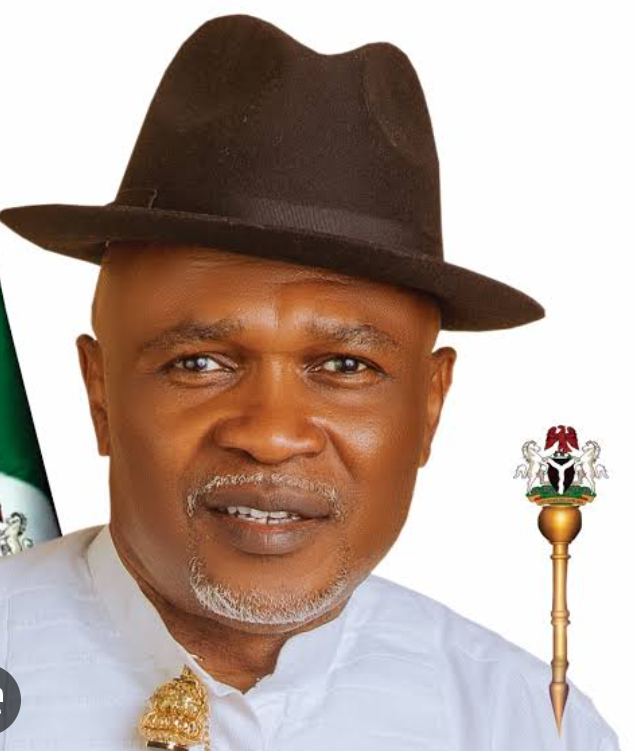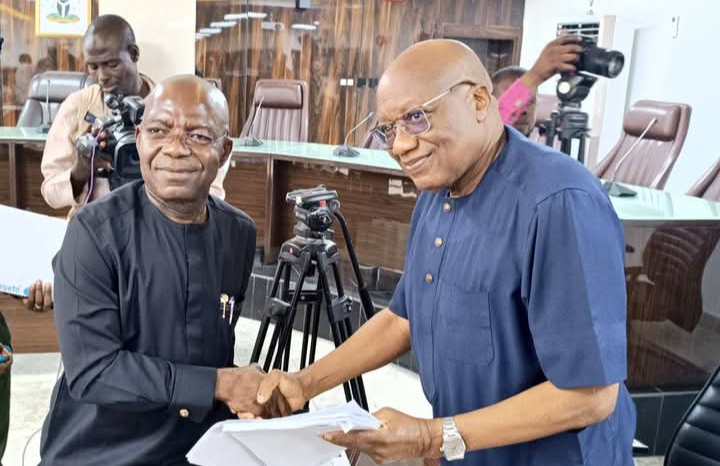News
APPRAISING LEGISLATIVE PERFORMANCE IN OBIO-AKPOR FEDERAL CONSTITUENCY

BY BOLAJI AFOLABI
Obio-Akpor is in Rivers state, and wears two caps; local government area headquarters and federal constituency. Situated in the metropolis of Port Harcourt, it is one of the biggest settlements in the oil-rich state. In fact, it is one of the major centres of massive economic activities in the country. Host to two of Nigeria’s biggest refineries, and numerous energy and manufacturing companies. Generally regarded as the economic behemoth of the Niger Delta region, it can be aptly classified as the financial pulse of Nigeria. It is one of the top five most developed LGAs in Nigeria; others being Eti Osa, Lagos Island, Bonny Island, and Abuja Municipal. Unarguably, Obio-Akpor is one of the most endowed and richest in terms of revenue generation. It is one of the two federal constituencies in Nigeria that has one LGA not two, three, or four as is common in others in the country. The other is Abeokuta South Federal Constituency. Fact is, it is one of the most strategically placed, and positioned in the “treasure base” of Nigeria; popular moniker for Rivers state. For economy, culture, and politics, it’s relevance cannot be shoved aside. In terms of location and population, it is ahead of many LGAs in the state. More importantly, it’s role in the economic growth, social transformation, and sectoral development of the state is huge, recognisable, and respectful. As a federal constituency, it consists 17 Wards, and made up of about 58 communities.
Densely populated, with pan-Nigerian composition amongst residents, and visitors as well as it’s economic and socio-political importance, every chief executive of the state; civilian and military accords Obio-Akpor huge measures of attention, focus, and direction. In many ways, it is the melting pot of Rivers as citizens from different and diverse ethnic nationalities of the state have taken occupation in Obio-Akpor. A first-time visitor may naturally feel at home as s/he will most likely notice people freely communicating, transacting, and relating in any of the three major languages and others. Given the high number of industries located in Obio-Akpor, human movement and vehicular traffic is enormous. This has also impacted positively on commerce, trade, and economic activities. The chain value of these engagements cannot be easily wished away. Many residents argue that this has affected costs of living. Some believes that residents deserve more attention by respective tiers of government. Few reiterated the need for private organisations to extend their corporate social responsibility (CSR) programmes to the nooks and crannies of the area. However, it has experienced (still experiencing) varied developmental challenges.
Over the years, Obio-Akpor has witnessed variation of stifled, stunted, and measured growth. Since it’s creation in 1989, it has passed through different stages of evolution. With its command-and-obey governance structure, the military despite long-term dictatorial rulership did not make appreciable impact in the LGA. Though it’s revenue base shored up, during this period but it had minimal impact on the general well-being of citizens and residents. Complaints of environmental degradation, infrastructural decrepitude, and residents neglect were the regular rhymes among people.
With Nigeria’s return to civilian governance in 1999, Obio-Akpor has passed through different stages of development. Between 1999 and now, personalities that have had the opportunity to be chairmen of the LGA, at various times contributed their quota towards it’s development. Indeed, it recorded massive infrastructural and institutional development between 1999 and 2007 when Chief Nyesom Wike was chairman. According to empirical records, empowerment and upliftment of the social standards of people was key to every initiative and programme carried out during his tenure. Many people believe that his overwhelming achievements as chairman has been the springboard for Wike’s continued relevance in politics and public service.
As a federal constituency, Obio-Akpor has been represented in the House of Representatives by three individuals at different periods since the birth of the Fourth Republic in 1999. These are Chukwuma Godswill, 1999 to 2003; Chinwe Ike, 2003 to 2011; and Kingsley Chinda, the incumbent since 2011. While Chukwuma and Chinwo served for one-term, and two-terms respectively, Chinda is on his fourth term. That the constituents decided to invest their electoral franchise on him for four consecutive terms; which will be 16 years of unbroken representation in 2027 speaks volume about his acceptability and deliveries.
According to the constitution of the Federal Republic of Nigeria, the roles of the legislature, as the second tier of government is legislation. An elected legislator at the state or national assembly is expected to be involved in lawmaking, oversight, and representation. The first two responsibilities are what lawmakers do internally, within the chamber, and routine checks of MDAs. Representation is what constituents see, and value. In Nigerian parlance it is described as “what he brings home.” Sadly, this has been the compass through which every lawmaker is assessed and verdict delivered on tour of duty by the constituents. Curiously, given the numerous economic challenges, social malaise, and developmental disequilibrium that pervades and ravage the country, majority of Nigerians rates the performance or otherwise of lawmakers on the basis of what the individual can attract to his/her constituents in particular, and the constituency in general.
After a distinguished public service career as Commissioner for Environment in Rivers state in the mid-2000s, Chinda was elected as the Member representing Obio-Akpor Federal Constituency in the House of Representatives in June 2011. Thus, he rose from being a state-wide public officer to a peoples-servant, and representative at national level. Conscious of the high expectations of his constituents, the glaring micro and macro challenges, and the records of his predecessors, he realized that he is condemned to perform. Chinda, a former student union leader, and legal practitioner has since took up the task of offering responsive and responsible representation to the people. How well has he done in eliciting the commendation, or criticisms of his constituents?
In over a decade, Obio-Akpor federal constituency has been in the news for very positive reasons. It has been promoted to national discourse and federal noticeability in quality measures. From the 7th to the 10th House of Representatives, the federal constituency’s name, and image has shown up as one of the few whose representative performed (still performing) brilliantly in lawmaking; oversight; and representation. At all levels of engagement, the constituency is consistently projected through the brilliance and intelligence of the representative. It has witnessed numerous projects, programmes, and initiatives that has cross-ethnic and broad-based impact on citizens and residents. From education to agriculture, skills development, capacity building, and other sectors there are visible achievements in each of the 17 wards.
This includes, but not limited to: yearly distribution of over 2,000 free JAMB forms; adult education scheme; regular payment of school fees for identified constituents in tertiary institutions and secondary schools; medical support to some constituents with health challenges. Also, constituents have benefitted from various skills acquisition, vocational, and entrepreneurial training programmes such as ICT, solar powered, welding, chalk production, snail farming and many others; medical outreaches and medical interventions. Equally, youths, women, and men have secured employments at the federal and state levels, as well as the private sector; many benefitted monetary incentives such as grants and loans for entrepreneurial ventures by MDAs and more.
In terms of Lawmaking and Oversight, Obio-Akpor federal constituency occupies the top-most level in the country. Ever driven by quest for national development through meaningful and realistic legislation, Chinda has continually written the constituency’s name in gold. Deploying his multi-sectoral and multi-dimensional credentials and expertise he has over 80 Motions to his name and constituency. Each of these motions which are people-centred and development-driven have elevated his status and constituency to national prominence. Fact is, he belongs to the “exclusive list” of lawmakers with the highest number of motions to their names and constituencies. With over ten Bills, at different stages of legislative interrogation, and considering their importance to nation building, Chinda has further played frontal role in deepening the constituency’s commitment to national development. At oversight functions, committee meetings, and other forum his enviable brilliance, profound understanding, and deep knowledge of issues which elicits commendations ushers inspiring and impactful positives to constituents and the constituency.
To every dispassionate and discernible follower of legislative developments since 1999, Chinda can rightly be described as a first-class legislator. Also, given his attributes as a courageous and committed lawmaker with deep knowledge of legislative ethos and rules he represents the perfect example of who and what a parliamentarian should be. For many of his past and present colleagues in the 7th to 10th Assemblies, his emergence as the Minority Leader is worthy testament to his serially-proven and time-tested legislative competencies, akin to icing on the cake for an illustrious parliamentary career. Being the first from Obio-Akpor federal constituency to attain such prominent position in the House of Representatives, and the National Assembly in general, the constituents are happy and appreciative of the impact made by him. As Oliver Twist, while they are asking for more, Chinda whose passion and commitment to community empowerment, and constituency development has been unequivocal is responding to this charge. Barely a year in office, he has facilitated some projects including two-day medical outreach; digital skills & artificial intelligence training for youths; digital skills training and few others. Majority of the constituents, affirms that he has done very well in projecting the enviable virtues of Obio-Akpor federal constituency which hinges on hard work, sincerity, boldness, selflessness, and dynamism. The unanimity of opinion is that he should continue to attract more developmental projects and programmes towards further elevating the status of the constituency, and deepening the well-being of people.
BOLAJI AFOLABI, a development communications specialist, was with the Office of Public Affairs in The Presidency.
News
SAD! APC lawmaker dies while asleep

The lawmaker representing Kaura Namoda South Constituency in the Zamfara State House of Assembly, Aminu Ibrahim Kasuwar-Daji, has died.
It was gathered that the lawmaker passed on in his sleep during the early hours of Wednesday.
Aminu Ibrahim Kasuwar-Daji’s sudden death came as a shock to many in the state, especially his colleagues and political associates.
The All Progressives Congress (APC) in Zamfara, the party under which he was elected, expressed deep sorrow over his passage.
Members of the party, including the State Working Committee and other supporters, described his death as a great loss.
They said he was known for his dedication and honesty in serving his people.
His family, community members in Kaura Namoda South, and fellow lawmakers have been thrown into mourning as preparations for his burial began.
According to Islamic rites, he was buried today at 3:00 pm in his hometown of Kasuwar-Daji, located in the Kaura Namoda Local Government Area.
Many in the state have continued to express grief as they remember the role he played in representing the people and contributing to the work of the state assembly.
News
Just in: Sam Olumekun takes over as INEC’s Acting Chairman

Mr. Sam Olumekun has taken over at the Independent National Electoral Commission (INEC) as Acting Chairman.
Olumekun is INEC’s National Commissioner in charge of Information and Voter Education.
He performed his first duties today, receiving a high-level delegation of the Labour Party (LP) at the Commission’s headquarters in Abuja with other National Commissioners in attendance.
The delegation was led by Abia State Governor Dr. Alex Otti, who visited the Commission to discuss key developments within the Labour Party.
It was gathered that both parties engaged in discussions centered on enhancing collaboration and reinforcing democratic values.
During the visit, Governor Otti formally presented a Certified True Copy of the recent Supreme Court judgment concerning the party’s leadership.
He noted that the meeting was aimed at fostering clarity, mutual understanding, and institutional alignment regarding the Labour Party’s current structure.
Mr. Olumekun, the Acting INEC Chairman, reaffirmed the Commission’s unwavering commitment to neutrality, transparency, and the rule of law in the discharge of its constitutional responsibilities.
Recall that a viral WhatsApp message had indicated that Prof. Mahmood was sacked by President Bola Tinubu and replaced with one Prof. Bashiru Olamilekan.
“INEC Chairman Prof. Mahmud Yakubu has been replaced with Prof. Bashiru Olamilekan by President Tinubu,” the message, which had no attribution, read. However, both INEC and the Presidency debunked the widespread report.
Yakubu, who is rounding off his second tenure in office, is expected to exit the system towards the end of this year.
The process of appointing an INEC chairman is the President nominating a candidate and forwarding his particulars to the Department of State Services (DSS) for profiling.
After such screening, the President, thereafter, takes the name to the National Council of State for its advisory review.
Based on the outcome, the President sends the name to the Senate for screening and confirmation.
News
Crude oil prices slide further, now selling below $57

Crude oil prices have dropped below $57, following a previous rate of $59.78.
This decline coincides with the imposition of tariffs on several countries by US President Donald Trump.
A report from West Texas Intermediate attributes this price slump to consistent 6% reductions observed last week.
JPMorgan Chase & Co has warned that these tariffs could likely push both the US and global economies into a recession this year.
The financial institution explained that the tariffs, set to take effect this week, are expected to have widespread economic repercussions.
Market analysts and the business community have expressed concerns about the negative implications of these measures, predicting a slowdown in economic activities and a subsequent decline in oil demand.
-

 News21 hours ago
News21 hours agoOERAF held memorial lecture on conflict resolution, security/safety of community in Nigeria
-

 News6 hours ago
News6 hours agoUS revokes more than 500 foreign student visas
-

 News20 hours ago
News20 hours agoHoR Minority Caucus decries killings in Plateau, Benue states, urges immediate presidential decisive actions
-

 News8 hours ago
News8 hours agoIbas picks administrators for 23 Rivers LGs(SEE list)
-

 News13 hours ago
News13 hours agoBandits have seized control of 64 communities in Plateau – Gov Muftwang
-

 News5 hours ago
News5 hours agoBanditry:” I was chained for 32days while in their den, killed my wife as I watch-Nat’l Assembly DD narrates experience
-

 Economy12 hours ago
Economy12 hours agoMobile Money transactions hit $1.68trn in one year
-

 News8 hours ago
News8 hours agoSAD! Roof Collapses At Nightclub Kills 44, Including province Gov





